Contents
 Summary
Summary
- JNJ warrants a position in your investment portfolio because of its financial strength, historical performance, and future growth prospects.
- It has been and will remain a long-term hold in our retirement accounts and in the FFJ Portfolio.
- JNJ is 1 of only 2 companies rated AAA by Moody’s which provides me peace of mind that my investment is not at risk.
- It is a member of the exclusive Dividend Kings group having increased its dividend for 50+ years.
- The shares are currently not on sale but are priced reasonably which prompted me to recently acquire additional shares.
- The recent dividends landed in our investment account within hours before receiving a text requesting funds to cover school related expenses.
Introduction
I am constantly amazed when I review the portfolios bloggers post on their site. I often see no, or very few, Johnson & Johnson (NYSE: JNJ) shares in their portfolio yet they hold shares in companies which are inferior to the quality and performance of JNJ.
I am not here to criticize what one does with their money. Based on my experience, however, JNJ is company that deserves a place in portfolio if you want to generate an ever increasing stream of dividend income that outpaces inflation and want to be able to sleep at night without worrying about the financial health of the company in which you have invested.
Several years ago I made the decision to acquire JNJ shares. I learned from some of my investment mistakes and took the best course of action with my JNJ shares. You guessed it....I tucked them away in various investment accounts and left the shares untouched. I even took the step of automatically reinvesting all dividends so that I wouldn’t risk messing up a good thing.
The only time I really paid any attention to these shares was on a quarterly basis when I updated my records to see how the dividend income was trending.
Background
While many investors are familiar with JNJ, some may be unaware that JNJ itself doesn’t actually do anything the way they may suspect. It is, rather, a holding company which has approximately 126,400 employees in more than 230 operating companies conducting business in virtually all countries of the world (Form 10-K as at January 1, 2017). These operating companies are the entities which are directly engaged in the research and development, manufacture and sale of a broad range of products in the health care field.
JNJ’s role is to provide operational support for these operating companies. This includes sourcing low-cost capital and the movement of funds within the conglomerate that allows lucrative opportunities to be seized. An example would be the declaration of distributions from profitable but slow growing companies for the purpose of transferring funds to entities that have a new idea which require funds to quickly capitalize on an opportunity.
The operating companies that fall under the JNJ holding company umbrella generally belong to the Consumer Products, Medical Devices, or Pharmaceutical Products categories.
You can read JNJ Strategic Framework here to get a better understanding of the conglomerate.
Product Pipeline
Given the nature of the pharmaceutical industry, companies require a robust product pipeline with products in various stages of development. JNJ and its subsidiaries’ product pipeline as at July 18, 2017 can be found here.
JNJ is continually acquiring companies and folding them under the JNJ umbrella. Earlier in 2017, JNJ acquired Actelion, a Swiss based company with a leading franchise of differentiated, innovative products for pulmonary arterial hypertension. JNJ viewed Actelion’s portfolio as being complimentary to the existing portfolio of the Janssen Pharmaceutical Companies (a member of JNJ).
In its January 26, 2017 Press Release, JNJ indicated that “the addition of Actelion’s specialty in-market medicines and late-stage products is consistent with Johnson & Johnson’s efforts to grow in attractive and complementary therapeutic areas and serve patients with serious illnesses and significant unmet medical need.”
Q2 2017 Results
There is minimal analysis of JNJ’s YTD results in this post. My reasoning for this is:
- JNJ released its Q2 results July 18, 2017 and is slated to release its Q3 results October 17, 2017.
- JNJ is only 1 of 2 companies rated AAA by Moody’s.
- I view an investment in JNJ solely from a valuation standpoint and not from a credit risk standpoint.
I am, therefore, merely providing the following images from the Q2 2017 Earnings Release for reference purposes.
Dividends and Dividend Growth
JNJ is a member of the exclusive Dividend Kings group having increased its dividend for 50+ consecutive years. Its dividend history dating back to 1972 can be found here.
Currently, the dividend yield is ~2.5% based on a stock price of ~$134.
I note that JNJ has ample FCF and the dividend payout ratio of ~55% leaves room for the continuation of dividend increases.
In addition, while JNJ’s dividend growth has slowed in recent years, it is still increasing at a rate that is well in excess of the rate of inflation.
What does this mean? Well, say you held 1000 JNJ shares. On September 12, 2017 you would have received $840 in your brokerage account.
If your situation was similar to our situation, when your favorite daughter texted you (our only child never calls) saying she needed money for textbooks and other school related expenses you could have looked at your brokerage account and said “Thank you JNJ!”.
The story gets even better because I suspect that same favorite daughter will make a similar request in January 2018 and September 2018. Come September 2018, JNJ’s quarterly dividend will probably have been increased to $882 (based on a conservative 5% growth rate).
Just imagine, one day that favorite child will stop asking for money. Think of how you’ll be able to benefit from all those annual dividend increases!
Valuation
In its Q2 2017 presentation, JNJ provided an adjusted EPS range of $7.12 - $7.22 on a reported basis.
Multiple brokers have projected 2017 Adjusted EPS of $7.18/share which is roughly the mid-point of JNJ’s guidance.
Using the current stock price of ~$134 and an Adjusted EPS estimate of $7.18, I get a forward PE of ~18.7. While not nearly as attractive as the levels evidenced during the Financial Crisis, I view the current level as reasonable for a company of JNJ’s quality.
Johnson & Johnson Stock Analysis - Final Thoughts
In my opinion, JNJ is one of the stocks investors should hold in their portfolio for the long-term if they are seeking safety, capital appreciation, and steadily increasing dividends; it is a member of my FFJ Master Stock List.
As a Canadian resident who holds a significant proportion of our overall equity investments in US listed companies, I have evidenced a sizable hit to the total value of our portfolio as a result of the recent strengthening of the Canadian dollar relative to the US dollar. While forecasts suggest our Canadian dollar will continue to strengthen relative to the US dollar well into 2018, I am not concerned about my most recent JNJ share acquisition for my registered retirement savings plan account and for the FFJ Portfolio.
If my example on the use of dividends is totally irrelevant to you, envision JNJ dividends covering expenses that are relevant to you. It will give you a warm and fuzzy feeling.
Note: I sincerely appreciate the time you took to read this post. As always, please leave any feedback and questions you may have in the “Contact Me Here” section to the right.
Disclaimer: I have no knowledge of your individual circumstances and am not providing individualized advice or recommendations. I encourage you not to make any investment decision without conducting your own research and due diligence. You should also consult your financial advisor about your specific situation.
Disclosure: I am long JNJ.
I wrote this article myself and it expresses my own opinions. I am not receiving compensation for it and have no business relationship with any company whose stock is mentioned in this article.


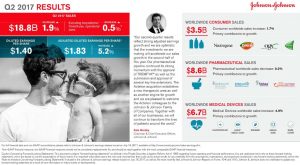
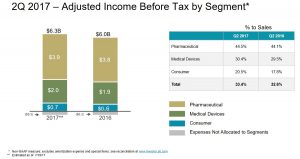
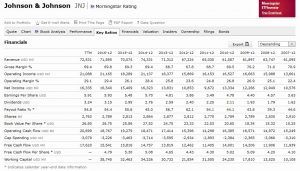
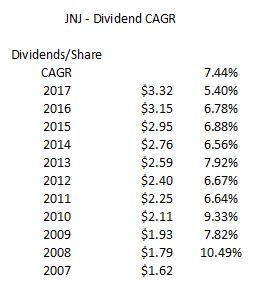
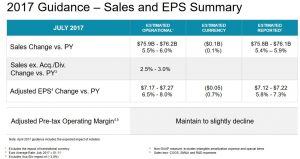
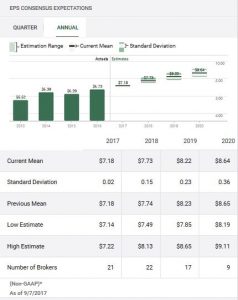
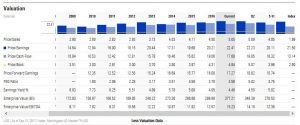
Hi there. I enjoyed reading your column on Sure Dividend and decided to visit your blog. I completely agree with your investment philosophy and when people look to enter the stock market and ask me “what should I buy?”, I always suggest Johnson & Johnson + ScotiaBank as starting companies in any portfolio (even before an ETF) provided they aren’t excessively valued. One thing to cover in future posts might be information around risks – J&J is facing a lot of competition from generic drug companies and it is being sued to the whazoo due to the cancer risks being caused by its baby powder. What could this mean for J&J’s profitability and future dividend prospects? I personally think J&J is a highly adaptable company and unfortunately a few drugs/treatments going wrong here and there is part of the risk in medicine, so over the next 10 years I think J&J will higher than where it is today and will be covering more of your daughter’s expenses.
AussieInvestor,
Thanks for the suggestion about covering the risk topic in future posts.
I hear you about the baby powder lawsuits and I certainly feel for those impacted.
If I take the emotional aspect out of the equation though…..the damages awarded to date have been sizable from our perspective. You have to remember, however, that the amounts are relatively small when compared to JNJ’s annual FCF which, in FY2016, was ~$15.5B.
JNJ has undoubtedly gone through its fair share of legal battles and I am certain the Baby Powder issue will not sink the company.
I know Moody’s is not perfect but if they thought the baby powder legal matter was an issue I suspect they would have downgraded JNJ from its coveted AAA credit rating.
Regretably, the nature of the business is such that some drugs/treatments will turn out to cause more harm than good. Like you correctly have pointed out, that’s a huge risk. I suspect it might be difficult to identify any company in the medical space where one of its products has not harmed those who were meant to be treated/cured.
Glad you stumbled upon my Sure Dividend post.
Thanks for reading and commenting.
Charles